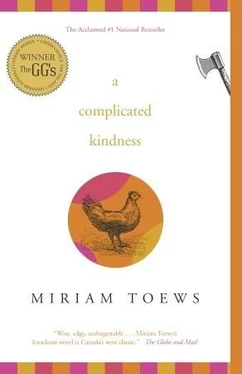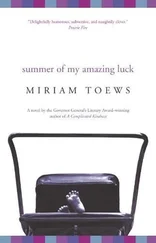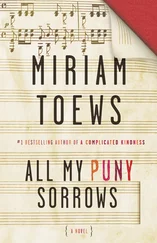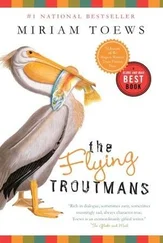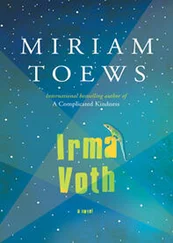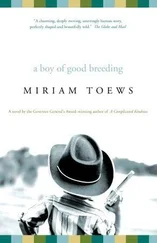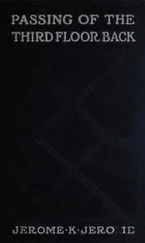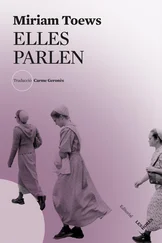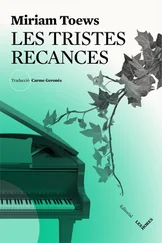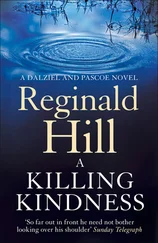I remained in the garage but moved from the floor to the top of the freezer to get away from the ants. I realized while lying down on it that my body could easily fit inside. I imagined Tash walking up to me, in frayed cut-offs with cotton balls between her toes, saying: No, it wouldn’t. It’s designed to hold casseroles and pork chops and things. Don’t let’s be the kind of family discovered in freezers.

My sister once gave me a Valentine’s card that said Jim Jones loves you. It had a rainbow decal inside that I stuck into the exact centre of our large picture window.
When my dad saw it he asked me what it was. A rainbow, I said. He said no…no and shook his head. He gave me a razor blade and a wet cloth. My dad wasn’t big on overt symbols of hope. His famous line was: Let’s not call it a celebration. He said that when his school was planning a twenty-year anniversary thing and the kids were making up the invitations for the general public to come and eat a sandwich and look and marvel at how things hadn’t changed, he suggested they use the words Twenty Years: A Retrospective.
Trudie had said but honey, I think celebration sounds nice and Ray had said yes, it does sound nice. Tash had suggested Twenty Years: A Long, Arduous Journey, which my dad had liked and didn’t realize until later that she’d been joking.
On long drives Tash would be forced to share her thoughts with me in the back seat of the car. Her big thing was noticing things nobody else had, like: Ever noticed how nobody names their kid Cain any more? Ever noticed how Mom and Dad can say open house and come and go and do but never party? We had parents who couldn’t say party. We were in the car on a long, boring trip somewhere. We thought of ways to make them say party.
Okay, said Tash, we’ll do word association. I say birthday, Mom, what do you say? Cake? said my mom. Suit? Then I tried: Okay, Dad, this is more like a fill-in-the-blanks game. I go to a restaurant, the hostess person comes up to me and says how many people in your…? My dad said family? Car? Tash said god and rolled down the window just far enough for her to put her head through it. When my dad said Tash, please don’t do that, please get your head back inside the car, she closed the window even tighter around her neck so it looked like she would eventually pinch it right off and her head would go sailing off into the sky like a lost balloon. Her hair was whipping around wildly and her lips were stretched back and turning blue in the wind and she slowly dug her thumbnail into her arm until she’d engraved in herself a little bleeding crescent moon. That was how badly she needed to hear my parents say party. Finally my dad stopped the car somewhere around the exit to Falcon Lake and we waited for Tash to sit properly in the back seat. That took about five or ten minutes. My mom said: Honey, we were playing along. We were only teasing you. I had to get out of the car and go around to give Tash a sip of my Coke, so she wouldn’t dehydrate in the sun. I don’t know why it meant so much to her. Everything always did. I sometimes wonder if they’d said party that day if things could have been different. Things shouldn’t hinge on so very little. Sneeze and you’re highway carnage. Remove one tiny stone and bang, you’re an avalanche statistic. But I guess if you can die without ever understanding how it happened then you can also live without a complete understanding of how. And in a way that’s kind of relaxing.
It was an idea, more than anything, that started the whole thing. It was the seventies then, and although our town was a secret town (The Mouth suggested that when we look in the mirror there should be no reflection because who we are is something that we cannot see), some of the less oppressed teenagers were able to pick up signals from the outside on their invisible radars. Tash especially.
The Mouth came to our house one evening to tell my sister that her physical self was irrelevant. She said okay, thanks for that. Thank you for coming over here to tell me that. And when he left, she shouted oh my god and got on the phone immediately to tell her friends about the latest Buddhist-tinged interpretation of the gospel according to The Mouth.
That was around the time our Aunt Gonad asked Tash to burn her Jesus Christ Superstar soundtrack. Tash could do a hilariously sexy version of “I Don’t Know How to Love Him” where she basically worked herself into a complete fake orgasm during that big crescendo. Ian could play it on the piano because every good or previously good Menno kid knew how to play the piano and she’d drape herself all over him and sing and moan while he banged out the tune and laughed his head off.
Please don’t schput, Ray would say. He never made a big scene. He’d go into the basement and practise his typing or work on his watercolours.
Tash was gone a lot of the time. In the summer she’d sleep till one or two in the afternoon and then get up and put on loud music and cool clothes and grab an apple or something from the fridge and leave. She had this thin silver chain that she wore low around her waist and sometimes when she walked out into the yard it would catch a ray of sunlight and the reflection was so bright and flashy it made me have to look away and I liked to think it was a message of some kind. Like, zap, I love you. Or something like that.
My parents and I would stand in the living room staring at her through the picture window. There she goes, my dad would say. Jingling the money in his pocket the way he did for an entire day and night when my mom left. And my mom would say well, it’s normal, honey, let’s not make too big a deal out of it or it will just get worse. But although my mom was philosophically cool about a lot of stuff, her eyes lingered on things, like Tash when she walked down the driveway and got into Ian’s van. I used to count the seconds that passed between the time Trudie would first fix her gaze on Tash as she left and the time she would turn to look at me all bright-eyed and smiling saying well, what’s next? Nine or ten seconds, usually. There’s very little turnaround time for a mother to go from careworn to (fake) enthusiastic but Trudie was a pro and I loved her for it and it didn’t occur to me then that that sort of bravura could have a shelf life. For all I knew Trudie was also taking heart from the quick laser reflection of sunlight off Tash’s silver waist chain.
It was around then, during the days of Tash’s silver-waist-chain period, that Mr. Quiring came to our house for a meeting with Ray and Trudie about Tash skipping out of classes and not getting her assignments in and, quote, leading the class, when she was there, in mini-revolts that she thinks are humorous, etc. etc. He told Ray and Trudie that he considered himself to be a patient and long-suffering man but that it had to end somewhere. It does? Trudie had asked.
Ray was outside watering the flowers and Trudie was cooking something in the kitchen and I was…I don’t know what I was doing. I answered the door. Tash wasn’t at home. And my mom was flustered at first because she didn’t know what Mr. Quiring wanted or why he was there and he seemed a little nervous too, standing there in the front entrance. And then Ray came in, his hands all dirty, and Mr. Quiring asked if it was a good time to talk about Tash, and Ray and Trudie thought it was and I made tea and sat on the couch and listened.
But he was really nice about it and he told Trudie that he thought Tash had a lot of talent and a sharp intellect. And he said she had dramatic flair and that it was a shame there was no place in town where she could develop that. He was wearing sandals and jeans. And just those three things combined — saying that Tash had dramatic flair, expressing regret that it would probably never be realized in East Village, and wearing jeans and sandals — made him seem like the original hipster man, especially next to Ray who hadn’t even taken off his tie to do the gardening and had probably never used the word flair in his life except maybe to describe somebody with a flair for modesty. Ray seemed so much older than him but he isn’t really at all.
Читать дальше
